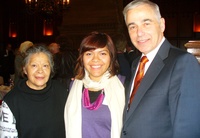A special group of students will graduate this May, many the first in their families to do so. This is the story behind how the University helped get them there.
Illinois Alumni April 2009
Lhea Randle dreamed since she was 8 years old that she would go to college, but when her mom died, it looked like her plans might go up in smoke. Mauriell Amechi, commuting one hour each way to high school and being raised by his grandmother, felt that college was his “destiny.” Silvia Gonzalez, for whom English was her second language, was determined as a child to graduate from college, better herself and help her family in the process.
These students are among the more than 500 being helped by the Illinois Promise scholarship program, first announced by Chancellor Richard Herman in 2004. This spring, the first cohort of students with Illinois Promise support will graduate. Illinois Promise, or I-Promise as it is known, makes up the difference between what these students receive in aid from federal and state programs and what their University of Illinois education will cost – including tuition, fees, books, and room and board – throughout their four years on the Urbana campus. Many of these students are first-generation college students, a characteristic they share with Herman.
Overcoming obstacles
“I think it is completely underestimated how hard it is to be a first-generation college student,” says Gonzalez, who, like more than three-quarters of the students in the I-Promise group, is the first in her family to attend a university.
The stories of Gonzalez, Randle and Amechi are just a few examples of the kinds of challenges I-Promise students face, often with a potent mix of faith, humor and fortitude.
Randle, for example, who is graduating with a degree in both political science and communications, grew up in the Park Forest suburb of Chicago. “I was researching Harvard when I was 8,” she says. But her mother died when Randle was 16, and her father, an alcoholic, became verbally abusive. First the electricity, then the water were turned off. Eventually he lost the family home, and Randle moved in with her older sister. She’s been on her own financially from the time her mother died.
“When I decided to apply to college on my own, it was a blessing to have the University understand that I really didn’t have parents. I had a father, but he wasn’t really a father,” says Randle, whose smooth, dark skin seems to glow with energy and whose lively eyes shine from behind stylish eyeglasses.
A James Scholar, Randle is also very active in student government and in I-Promise outreach (when she first saw some students helping at an I-Promise event, she thought, “Wait, I want to get involved, too!”). In addition, she has a part-time job at the Institute of Government and Public Affairs on campus.
“I’m about giving support rather than getting support,” says Randle. “Even at my mom’s funeral, my friends were crying, and I was comforting them.”
Randle plans to find an internship in the state legislature next year and then get a doctorate in political science and a master’s degree in public policy.
Gonzalez, whose hair feathers her round face, is a sophomore double-majoring in photography and art education. A pair of dangling earrings emphasizes her exotic eyes and bronze skin. She does not pretend that her journey has been easy, but she embraces the challenges.
“One of the biggest things I have come to appreciate is that it’s OK to struggle and even to fail, because we grow and it is a process,” says Gonzalez.
She is determined to graduate from college in order to help her mother and sister have a better life. She is equally determined to help her fellow students.
“When you are given a lot, you should give back,” she said. “Part of I-Promise is that I really feel connected to Illinois because of it and because I can help out other students. There are lots of students like me, first generation. I want to be able to reach out, make it easier for them.”
Amechi, a sophomore in communications, commuted one hour each way to Von Steuben Metropolitan Science Center on the north side of Chicago.
“It was a sacrifice I had to make if I wanted to go to college,” says the lanky, 6-foot-tall African-American with high cheekbones, a small beard, ready smile and the collected demeanor of a full-grown man.
Amechi, like other I-Promise students, does not take much for granted. One month before he graduated from high school, his grandmother died. The same day his family got an eviction notice. The next summer he was robbed at gunpoint.
“I was just happy to survive,” he says.
His struggles do not make him waver.
“I remind myself that God will never put me in a situation I cannot overcome, ” he says. “I view every challenge in my life as a test from God, who strengthens me. In the end, I’m extremely thankful for all the doors he has opened for me.”
Having opened those doors, Amechi feels it is important to hold them open for those behind him.
“I have been placed in a situation to help others,” he says. “I will be able to make an impact on their lives like he has made on my life.”
Helping beyond the classroom walls
One reason behind the success that Randle, Gonzalez and Amechi have achieved is the set-up of the I-Promise program itself.
Realization has been growing that in such programs, mentoring is at least as important as financial aid. Statistics show that first-generation college students drop out at a higher rate than does the general population, and not just for financial reasons. For these students particularly, the campus environment can be bewildering, intimidating and overwhelming.
This is where Illinois Promise director Susan Gershenfeld comes in. For her, the program is not just about money – it is also about homemade cookies. Gershenfeld, who joined the University in 2008, saw that for Illinois Promise to successfully attract and retain low-income, high-achieving students, she had to help create a nurturing environment.
So as the newest Illinois Promise students were arriving on campus last August, Gershenfeld’s husband, Dean Joel Cutcher-Gershenfeld of the Institute for Labor and Industrial Relations, baked 25 dozen chocolate-chip and peanut-butter cookies, which current I-Promise students delivered to the incoming ones. With the cookies came a “care package” of information on campus resources, such as McKinley Health Center, as well as tutoring and leadership opportunities.
“All these different resources that exist on campus, which are fabulous, it’s all right there in the packet,” says Gershenfeld.
Gershenfeld, who has both an MBA and a master’s degree in social work, has organized sessions on financial literacy and sponsored social events, like a group ice skating outing followed by hot chocolate. She meets regularly with a variety of I-Promise students, individually and in groups, but “always over food,” she says. Subsequently, several students have made it a habit to just drop by and let her know how things are going. All in all, she has her finger on the pulse of what these students need to succeed.
What’s more, Gershenfeld also has created a campus advisory group whose members are involved in everything from housing and financial aid to alumni affairs. The members of this group are in a position to be involved in planning and policies that can further help these students.
And her efforts are paying off: The retention rate of students in the program is 82 percent, as compared to 83 percent campuswide. In addition, 43 percent of I-Promise students plan to go to graduate school, as compared to 34 percent across the campus. “I-Promise is much less about the money and much more about the mentoring and the community,” says Gershenfeld of her efforts.
And the I-Promise students adore her.
“Susan stands for I-Promise, for community, support and encouragement. It’s nice to see that manifested in a person,” says Gonzalez. “She’s just so loving. I’m so glad I met her.”
The admiration is mutual. Gershenfeld is humbled by the stories of perseverance in the face of enormous challenges many I-Promise students have.
“I love these students. They are remarkable,” she says. “They have overcome so many challenges, and they still are [doing so]. Everyone has a story. They don’t take things for granted.”
Paying it forward
I-Promise students believe their stories can help inspire others to pursue their dreams of higher education. Last year, for example, Gonzalez traveled with Gershenfeld to Chicago to share her story with an audience of people involved in the Brilliant Futures fundraising campaign.
“I talked about my experiences, what it means to me,” said Gonzalez. “And all the waiters came up to me afterward and said in Spanish, ‘We are so proud of you. When I saw you, I imagined my daughter doing the same thing. This is why we work so hard for our children.’
“‘Si, se puede,’ they said. It’s Spanish for ‘Yes, we can.’”
“Brilliant Futures and I-Promise, that’s great,” says Gonzalez of both the campaign and the program. “That’s a promise that I’m assured a brilliant future. If that’s cheesy, I don’t care, because that’s how I feel,” she says.



0 Comments